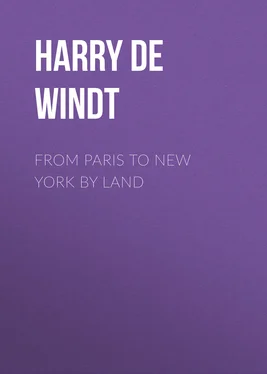Harry De Windt - From Paris to New York by Land
Здесь есть возможность читать онлайн «Harry De Windt - From Paris to New York by Land» — ознакомительный отрывок электронной книги совершенно бесплатно, а после прочтения отрывка купить полную версию. В некоторых случаях можно слушать аудио, скачать через торрент в формате fb2 и присутствует краткое содержание. Жанр: foreign_prose, foreign_antique, на английском языке. Описание произведения, (предисловие) а так же отзывы посетителей доступны на портале библиотеки ЛибКат.
- Название:From Paris to New York by Land
- Автор:
- Жанр:
- Год:неизвестен
- ISBN:нет данных
- Рейтинг книги:4 / 5. Голосов: 1
-
Избранное:Добавить в избранное
- Отзывы:
-
Ваша оценка:
- 80
- 1
- 2
- 3
- 4
- 5
From Paris to New York by Land: краткое содержание, описание и аннотация
Предлагаем к чтению аннотацию, описание, краткое содержание или предисловие (зависит от того, что написал сам автор книги «From Paris to New York by Land»). Если вы не нашли необходимую информацию о книге — напишите в комментариях, мы постараемся отыскать её.
From Paris to New York by Land — читать онлайн ознакомительный отрывок
Ниже представлен текст книги, разбитый по страницам. Система сохранения места последней прочитанной страницы, позволяет с удобством читать онлайн бесплатно книгу «From Paris to New York by Land», без необходимости каждый раз заново искать на чём Вы остановились. Поставьте закладку, и сможете в любой момент перейти на страницу, на которой закончили чтение.
Интервал:
Закладка:
At 10 P.M., on January 4, we left Moscow, in a blinding snowstorm, a mild foretaste of the Arctic blizzards to come, which would be experienced without the advantage of a warm and well-lit compartment to view them from. For this train was truly an ambulant palace of luxury. An excellent restaurant, a library, pianos, baths, and last, but not least, a spacious and well-furnished compartment with every comfort, electric and otherwise (and without fellow travellers), rendered this first "étape" of our great land journey one to recall in after days with a longing regret. But we had nearly a fortnight of pleasant travel before us and resolved to make the most of it. Fortunately the train was not crowded. Some cavalry officers bound for Manchuria, three or four Siberian merchants and their families, and a few Tartars of the better class. The officers were capital fellows, full of life and gaiety (Russian officers generally are), the merchants and their women-folk sociable and musically inclined. Nearly every one spoke French, and the time passed pleasantly enough, for although the days were terribly monotonous, evenings enlivened by music and cards, followed by cheery little suppers towards the small hours, almost atoned for their hours of boredom.
Nevertheless, I cannot recommend this railway journey, even as far as Irkutsk, to those on pleasure bent, for the Trans-Siberian is no tourist line, notwithstanding the alluring advertisements which periodically appear during the holiday season. Climatically the journey is a delightful one in winter time, for Siberia is then at its best—not the Siberia of the English dramatist: howling blizzards, chained convicts, wolves and the knout, but a smiling land of promise and plenty even under its limitless mantle of snow. The landscape is dreary, of course, but most days you have the blue cloudless sky and dazzling sunshine, so often sought in vain on the Riviera. At mid-day your sunlit compartment is often too warm to be pleasant, when outside it is 10° below zero. But the air is too dry and bracing for discomfort, although the pleasant breeze we are enjoying here will presently be torturing unhappy mortals in London in the shape of a boisterous and biting east wind. On the other hand, the monotony after a time becomes almost unbearable. All day long the eye rests vacantly upon a dreary white plain, alternating with green belts of woodland, while occasionally the train plunges into dense dark pine forest only to emerge again upon the same eternal "plateau" of silence and snow. Now and again we pass a village, a brown blur on the limitless white, rarely a town, a few wooden houses clustering around a green dome and gilt crosses, but it is all very mournful and depressing, especially to one fresh from Europe. This train has one advantage, there is no rattle or roar about it, as it steals like a silent ghost across the desolate steppes. As a cure for insomnia it would be invaluable, and we therefore sleep a good deal, but most of the day is passed in the restaurant. Here the military element is generally engrossed in an interminable game of Vint 1 1 Russian whist.
(during the process of which a Jew civilian is mercilessly rooked), but our piano is a godsend and most Russian women are born musicians. So after déjeuner we join the fair sex, who beguile the hours with Glinka and Tchaikovsky until they can play and sing no more. By the way, no one ever knows the time of day and no one particularly wants to. Petersburg time is kept throughout the journey and the result is obvious. We occasionally find ourselves lunching at breakfast time and dining when we should have supped, but who cares? although in any other clime bottled beer at 8 A.M. might have unpleasant results.
The Ural Mountains (which are merely downs) are crossed. Here the stations are built with some attempt at coquetry, for the district teems with mineral wealth, and in summer is much frequented by fashionable pleasure-seekers and invalids, for there are baths and waters in the neighbourhood. One station reminds me of Homburg or Wiesbaden with its gay restaurant, flower-stall, and a little shop for the sale of trinkets in silver and malachite, and the precious stones found in this region—Alexandrites, garnets and amethysts. But beyond the Urals we are once more lost in the desolate plains across which the train crawls softly and silently at the rate of about ten miles an hour. I know of only one slower railway in the world, that from Jaffa to Jerusalem, where I have seen children leap on and off the car-steps of the train while in motion, and the driver alight, without actually stopping his engine, to gather wildflowers! We cross the great Obi and Yenisei rivers over magnificent bridges of iron and Finnish granite, which cost millions of roubles to construct. Krasnoyarsk is passed by night, but its glittering array of electric lights suggests a city many times the size of the tiny town I passed through in a tarantass while travelling in 1887 from Pekin to Paris. So the days crawl wearily away. Passengers come and passengers go, but this train, like the brook, goes on for ever. Although the travelling was luxurious I can honestly say that this was the most wearisome portion of the entire journey. But all things must have an end, even on the Trans-Siberian Railway, and on the tenth day out from Moscow we reach (unconsciously) our destination—Irkutsk. For it is two o'clock in the morning and we are aroused from pleasant dreams in a warm and cosy bed to embark upon a drive of about three miles through wind and snow in an open droshky . But we are now in Eastern Siberia, and comfort will soon be a thing of the past.
CHAPTER II
THE PARIS OF SIBERIA
We arrived in Irkutsk on the eve of the Russian New Year, when business throughout the Empire comes to a standstill, and revelry amongst all classes reigns supreme. It was, therefore, useless to think of resuming our journey for at least a week, for sleighs must be procured, to say nothing of that important document, a special letter of recommendation, which I was to receive from the Governor-General of Siberia. But a resplendent aide-de-camp called at the hotel and regretfully informed me that State and social functions would keep his Excellency fully occupied for several days. It was hopeless, he added, to think of getting sleighs built while vodka was running like water amongst the people. So there was nothing for it but to await the end of the festival with patience, without which commodity no traveller should ever dream of visiting Asiatic Russia. He is otherwise apt to become a raving lunatic.
Irkutsk has several so-called hotels, the only one in any way habitable being the "Hotel Metropole," a name which has become suggestive of gold-laced porters and gilded halls. It was, therefore, rather a shock to enter a noisome den, suggestive of a Whitechapel slum, although its prices equalled those of the Carlton in Pall Mall. The house was new but jerry-built, reeked of drains, and swarmed with vermin. Having kept us shivering for half an hour in the cold, a sleepy, shock-headed lad with guttering candle appeared and led the way to a dark and ill-smelling sleeping-apartment. The latter contained an iron bedstead (an unknown luxury here a decade ago), but relays of guests had evidently used the crumpled sheets and grimy pillows. Bathroom and washstand were supplied by a rusty brass tap, placed, pro bono publico , in the corridor. Our meals in the restaurant were inferior to those of a fifth-rate gargotte . And this was the best hotel in the "Paris of Siberia," as enthusiastic Siberians have christened their capital.
Irkutsk now has a population of over 80,000. It stands on a peninsular formed by the confluence of two rivers, the clear and swiftly-flowing Angará (which rises in Lake Baikal to join the river Yenisei just below Yeniseisk), and the small and unimportant Irkut river. It is an unfinished, slipshod city, a strange mixture of squalor and grandeur, with tortuous, ill-paved streets, where the wayfarer looks instinctively for the "No-thoroughfare" board. There is one long straggling main street with fairly good shops and buildings, but beyond this Irkutsk remains much the same dull, dreary-looking place that I remember in the early nineties, before the railway had aroused the town from its slumber of centuries. Even now, the place is absolutely primitive and uncivilised, from an European point of view, and the yellow Chinese and beady-eyed Tartars who throng the business quarters are quite in keeping with the Oriental filth around, unredeemed by the usual Eastern colour and romance. On fine mornings the Market Place presents a curious and interesting appearance, for here you may see the Celestial in flowery silk elbowing the fur-clad Yakute and Bokhara shaking hands with Japan. The Irkutsk district is peopled by the Buriates, who originally came from Trans-Baikalia, but who have now become more Russianised than any other Siberian race. The Buriat dialect is a kind of patois composed of Mongolian and Chinese; the religion Buddhism. About every fourth Buriat becomes a Lama, and takes vows of celibacy. They are thrifty, industrious people, ordinarily of an honest, hospitable disposition, who number, perhaps, 300,000 in all. This is probably the most civilised aboriginal race in Siberia, and many Buriates now wear European dress, and are employed as Government officials.
Читать дальшеИнтервал:
Закладка:
Похожие книги на «From Paris to New York by Land»
Представляем Вашему вниманию похожие книги на «From Paris to New York by Land» списком для выбора. Мы отобрали схожую по названию и смыслу литературу в надежде предоставить читателям больше вариантов отыскать новые, интересные, ещё непрочитанные произведения.
Обсуждение, отзывы о книге «From Paris to New York by Land» и просто собственные мнения читателей. Оставьте ваши комментарии, напишите, что Вы думаете о произведении, его смысле или главных героях. Укажите что конкретно понравилось, а что нет, и почему Вы так считаете.












